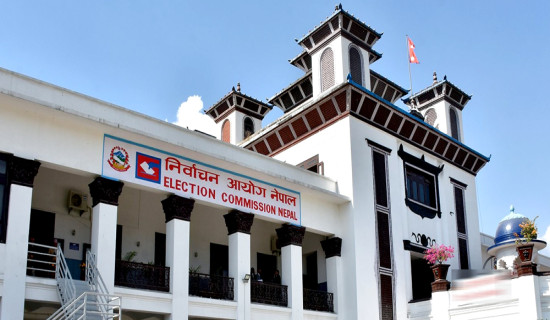- Sunday, 1 March 2026
Promote Exclusive Breastfeeding
Nepal celebrated annual World Breastfeeding Week this year with the theme "prioritise Breastfeeding: Create Sustainable Support Systems". Breastfeeding is not only a personal decision but is a public health issue that has a substantial impact on the growth and health of both the mothers and children. Breastfeeding is one of the best strategies to guarantee survival of a child and foster lifelong health, according to the World Health Organisation (WHO) and UNICEF. A nation that struggles with maternal health issues, hunger, and limited access to medical treatment, breastfeeding becomes even more crucial.
Breast milk is a natural, comprehensive, and well-balanced diet that gives a baby all the nutrients they require for the first six months of life. Two leading causes of newborn deaths in Nepal are pneumonia and diarrhea. Breast milk has antibodies that help shield babies from those common childhood diseases. Exclusive breastfeeding for the first six months of life and continuing for up to two years or more along with suitable supplemental foods provide long-term protection against malnutrition, obesity, and several non-communicable illnesses.
Inadequate support
Although 67 per cent of children under six months old were found to be exclusively breastfed as per the Nepal Demographic and Health Survey (NDHS) 2022, a sizable fraction of the population still does not adhere to the best breastfeeding practices. The adoption of suggested measures is hampered in many rural and underprivileged communities by a lack of knowledge, cultural beliefs, and inadequate maternal support networks.
In Nepal, the rates of stunting and malnutrition are significant. The data generated by NDHS (2025) shows that around 25 per cent of children under five suffer from stunting. Breast milk contains vital nutrients that are easily absorbed and appropriate during developmental stage. It also boosts immunity and hence, lessens the impact of infectious diseases. In many parts of the country, there is limited access to clean drinking water. It lowers the risk of waterborne infections that babies could get from bottle feeding or unsanitary supplemental foods.
Additionally, the NDHS reports that 55 per cent of babies are breastfed within the first hour of birth, which is crucial for lowering neonatal mortality. The colostrum, sometimes referred to as "liquid gold" serves as the infant's first vaccination and is high in antibodies. Colostrum is thrown out in many parts of Nepal, depriving neonates of these vital nutrients.
Breastfeeding has major health advantages for mothers. It has been proved that breast milk significantly reduces the incidence of ovarian and breast cancers, type 2 diabetes, and postpartum depression. It not only promotes normal birth spacing but also lessens postpartum hemorrhage. In regions where family planning facilities are limited, promoting and assisting breastfeeding can help close some of the gaps in maternal care and serve as a natural way of contraception for the first six months (lactational amenorrhea technique).
Barriers
Despite its obvious advantages, optimal breastfeeding in Nepal suffers due to numerous barriers. Some communities postpone breastfeeding after childbirth or discard colostrum owing to customary beliefs. Many women employed in agriculture or the unorganised sector do not have access to maternity leave or assistance. Aggressive infant formula marketing is having a growing impact on urban and semi-urban mothers that may lead to early weaning.
Health information regarding breastfeeding, particularly for teenagers and first-time mothers is lacking. The Baby-Friendly Hospital Initiative (BFHI) guidelines that guarantee mother-infant bonding and exclusive breastfeeding after birth. The guidelines often not be followed by hospitals, and health professionals due to lack of training in breastfeeding counselling. Nepal has made impressive progress in encouraging breastfeeding. The National Health Policy promotes breastfeeding, and the government has approved the National Strategy for Infant and Young Child Feeding (IYCF). Female Community Health Volunteers (FCHVs) also provide information on breastfeeding.
Breastfeeding-friendly policies
Moreover, there is still problem in policy implementation especially in hospitals and workplaces in the private sector. Many health facilities still lack qualified lactation consultants, and regulation of the International Code of Marketing of Breastmilk Substitutes is poor, especially in urban areas where formula milk promotion is common. Nepal needs a thorough and multi-sectoral strategy to increase breastfeeding rates and practices such as by making certain that all medical facilities adhere to BFHI regulations and provide lactation support training to medical staff. Encourage women and families. It is also important to implement breastfeeding-friendly policies and enforce maternity leave legislation, particularly in the unorganized and private sectors.
At the same time, adhering to more rigorously to the Code of Marketing of Breastmilk Substitutes is also important. Additionally, using culturally aware advertising and focused programmes help the underserved and rural communities. Nepal can set the path for a healthier and more just future for its mothers and children by accepting and promoting breastfeeding at all levels such as policy, health systems, community, and family. It is time to view breastfeeding as a human right and a public health priority, rather than as a custom.
(Dr. Lohani is the executive director at the Health Concern. lohanis@gmail.com)
















